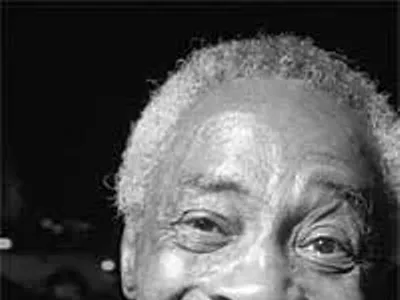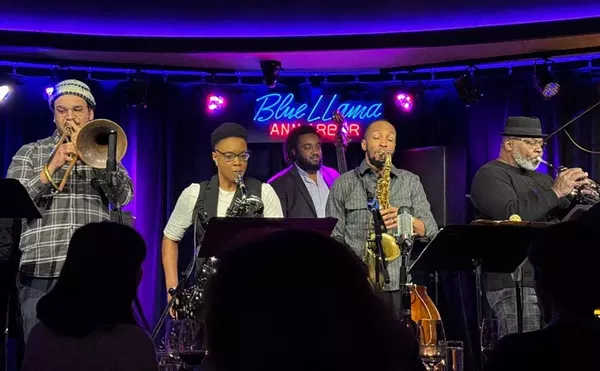It was that (un)godly sound that registered first — a prolonged shriek that spanged off the walls like it had been pulled up through the man’s spinal cord and flung into the air, a sound that pulled you up straight and nailed you in place. The sound of saxophonist Albert Ayler, claimed British music writer Valerie Wilmer, would scare the shit out of anyone.
Poet Ted Joans, in a 1971 piece for Coda magazine, recalled hearing Ayler’s band play for the first time in Copenhagen. The sound, wrote Joans, “was like screaming the word ‘FUCK’ in Saint Patrick’s Cathedral on crowded Easter Sunday.”
John Coltrane listened to the silence at the center of the universe and heard the voice of God, the love supreme. Only God and Ayler himself, whose drowned body was fished out of New York’s East River in 1970, know what Albert Ayler heard. But judging from the music it was terrifying, glorious, a keening tone so overwhelming it might have been rage, fear — or love at the very source.
So let us now praise Revenant Records, whose nine-disc Holy Ghost at last fixes Ayler’s too-brief career in the wide spot it deserves. Beginning in 1962 and running through July 1970 — four months before the discovery of his death — Holy Ghost chronicles Ayler’s whip-fast changes from sideman to bandleader to visionary. And given Ayler’s obscurity, it’s a welcome act of historical rescue.
Opening with Ayler’s 1962 European sojourn as sideman for Cecil Taylor and Finnish guitarist Herbert Katz, the sequence quickly moves to the earliest recordings of Ayler as bandleader (the group morphing from trio to quartet to quintet), representing multiple takes and arrangements of all his major compositions, including “Spirits,” “Bells,” “Truth is Marching In,” and brother Don Ayler’s moving “Our Prayer.” For avant-aficionados the core of the set will be Discs 2-5, which chronicle the dizzying speed with which Ayler progressed — building up and stripping down his sound so quickly it was like hearing a bomb blast.
From a practical standpoint, Ayler seems an unlikely candidate for the lavish treatment he receives on Holy Ghost — a collection filled to bursting with historical ephemera such as photographs, facsimiles of ’60s-era jazz and poetry magazines, a CD single of PFC Ayler playing with the 76th U.S. Army Band, even a pressed flower in a plastic slipcase, not to mention all this head-spinning music. But unlike Miles Davis, Rahsaan Roland Kirk, Yusef Lateef, Charles Mingus, John Coltrane and Ornette Coleman, indeed unlike virtually every other important post-bop jazz experimenter, Ayler remains all but unheard by the public at large, instead enjoying only the smallest circle of devotees. A handful of remarkable mid-’60s albums — most notably the twin peaks of Spiritual Unity and Bells — serve as the cornerstone of his legacy, yet in his prime Ayler was tagged the Great Black Hope of Great Black Music by John Coltrane himself. (“I was playing just like you,” Coltrane told Ayler, upon the release of Trane’s free-jazz masterwork Ascension.)
As was the case with its astounding 2001 Charley Patton box (Screamin’ and Hollerin’ the Blues), Revenant’s Ayler assemblage is both completist and reverential, a joyful balance between the archival and the emotional — mirroring, in short, Ayler’s own attitude toward Great Black Music itself. Of all the major music in the free-jazz movement, Ayler’s was arguably the most challenging, because his aesthetic was firmly rooted in the major indigenous forms of black American music, namely gospel, R&B, and blues. Perhaps the most remarkable attribute of Holy Ghost is its emphasis on Ayler’s focused explosion of those formal structures, over the course of eight years.
Tracing that arc is a daunting project — better than eight hours of music spread over seven discs (with two more devoted to meaty interviews with Ayler) — but the aggressively researched 208-page hardcover book included here places Ayler’s lifetime project into both biographical and cultural contexts.
Like the boxed sets of Coltrane’s Impulse! recordings and Coleman’s Atlantic sessions, Holy Ghost is essential for any avant-garde jazz library.
Eric Waggoner is a freelance writer. Contact him at [email protected]





